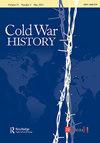Response to the article ‘Unfit for purpose: reassessing the development and deployment of French nuclear weapons (1956–74)’ by Pelopidas and Philippe
IF 0.3
2区 历史学
Q1 HISTORY
引用次数: 0
Abstract
In ‘Unfit for Purpose: Reassessing the Development and Deployment of French Nuclear Weapons (1956–74)’, we developed an interdisciplinary methodology combining archival material from France, the United Kingdom and the United States, as well as technical analysis of the performance of French nuclear weapon systems, to reassess the strategic rationality of the first generation of the force de frappe and its credibility. This is particularly important as, over the last three decades, claims about the strategic rationality of the procurement and credibility of the French nuclear force, which are at odds with discoveries about other nuclear weapon programmes, have been made across history and security studies. We found that ‘the development of the French nuclear force was chaotic and absent of any strategic rationality’ (p. 258) and that ‘French nuclear weapons lacked credibility until at least 1974’ (p. 259). We also corrected claims in security studies about the supposed security drivers of the French nuclear procurement strategy and the labelling of the French nuclear posture as ‘asymmetric escalation’, and confirmed an ‘existential deterrence bias’ in existing scholarship. Maurice Vaïsse and Dominique Mongin, in their response to our article, focus on our first two claims only but disprove neither. They engage in a critique of our scholarly methodology and standards, failing to address the fact that the article underwent a rigorous peer-review and editorial process. Finally, they attempt to undermine our findings by casting our work as ‘an ideological attempt to deconstruct history’. On the rationality of French nuclear weapon strategy, Vaïsse and Mongin rely solely on official French stated intentions as if they were adequate and sufficient evidence of the outcomes and technical performance of the arsenal. They are absolutely not, and we have established this in our article. We define ‘rationality’ as对Pelopidas和Philippe的文章“不符合目的:重新评估法国核武器的发展和部署(1956–74)”的回应
在“不适合目的:重新评估法国核武器的发展和部署(1956 - 1974)”中,我们开发了一种跨学科的方法,结合来自法国、英国和美国的档案材料,以及对法国核武器系统性能的技术分析,重新评估第一代核力量的战略合理性及其可信度。这一点尤其重要,因为在过去三十年中,关于法国核力量采购的战略合理性和可信度的说法,与其他核武器计划的发现不一致,已经在历史和安全研究中提出。我们发现“法国核力量的发展是混乱的,缺乏任何战略合理性”(第258页),“法国的核武器至少在1974年之前缺乏可信度”(第259页)。我们还纠正了安全研究中关于法国核采购战略的假定安全驱动因素的说法,以及将法国核态势标记为“不对称升级”的说法,并确认了现有学术中的“存在威慑偏见”。Maurice Vaïsse和Dominique Mongin在他们对我们文章的回应中,只关注了我们的前两个说法,但都没有反驳。他们对我们的学术方法和标准进行了批评,却没有说明这篇文章经过了严格的同行评审和编辑过程。最后,他们试图通过将我们的工作描述为“解构历史的意识形态尝试”来破坏我们的发现。关于法国核武器战略的合理性,Vaïsse和Mongin完全依赖法国官方声明的意图,仿佛它们是武器库成果和技术性能的充分证据。他们绝对不是,我们已经在我们的文章中证实了这一点。我们把“理性”定义为
本文章由计算机程序翻译,如有差异,请以英文原文为准。
求助全文
约1分钟内获得全文
求助全文

 求助内容:
求助内容: 应助结果提醒方式:
应助结果提醒方式:


